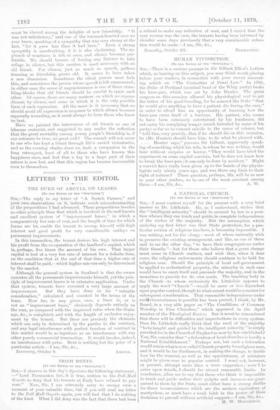A NATIONAL CHURCH. [To TEE EDITOR OF TUE " SPECTATOR.")
Sin,—I must content myself for the present with a very brief answer to Dr. Littledale. He, as I understand, wishes that the " intelligent minority " should be secured by law in a posi- tion whence they can teach and guide, in complete independence of the wishes of the majority. Rdt the assumption which underlay my first letter was that State protection, for a par- ticular section of religious teachers, is becoming impossible. I was writing, not for the clergy—most of whom naturally wish to preserve the existing arrangement, and like, as one of them said to me the other day, " to have their congregations under. their thumbs "—but for those who believe that a great change must come in Church matters, and wish that, when it does-
come, the religious endowments should continue to be held. for religious. uses. Should the. principle of local self-goVernment
be applied to ecclesiastical property, the minority in each case would have to exert itself and persuade the majority, and in the meantime to provide for its own needs. The teaching body in the Church—to whoM exclusively Dr. Littledale appears to- apply the word " Church "—would be more or less dependent upon popular control, though to what extent wouldbc a matter for- subsequent consideration. That reasonable independence under suclfcircumstances is possible has been proved, I think, by Mr.. Beard, in a very able paper on "The Conditions of Common Worship in Free Churches," which appeared. in the April number of the Theological Review. But it must be remembered that there will be difficulties and imperfections in every system.
Does Dr. Littledale really think that the need of the majority `` to be taught and guided by the intelligent minority " is amply provided for in the Church of England as now by law established P You, Sir, consider that " a federation of local churches is hardly a National Establishment." Perhaps not, but such a federation would retain what is now called Church property for religious uses,. and it would be for Parliament, in making the change, to decide how far the removal, as well as the appointment, of ministers might be given over to popular control. I must not, however, at present, attempt more than a mere suggestion ; were I to enter upon details, I should far exceed reasonable limits. In conclusion, allow me to say that those who think it impossible
to teach and guide unless their pulpits and incomes are guar- anteed to them by tho State, must either have a strong dislike for those inconveniences which are the mOdern equivalent of martyrdom, or must have a weak faith in the power of their doctrines to prevail without artificial support.—I am, Sir, Sc.,
M. W. MocanIncE.
































 Previous page
Previous page